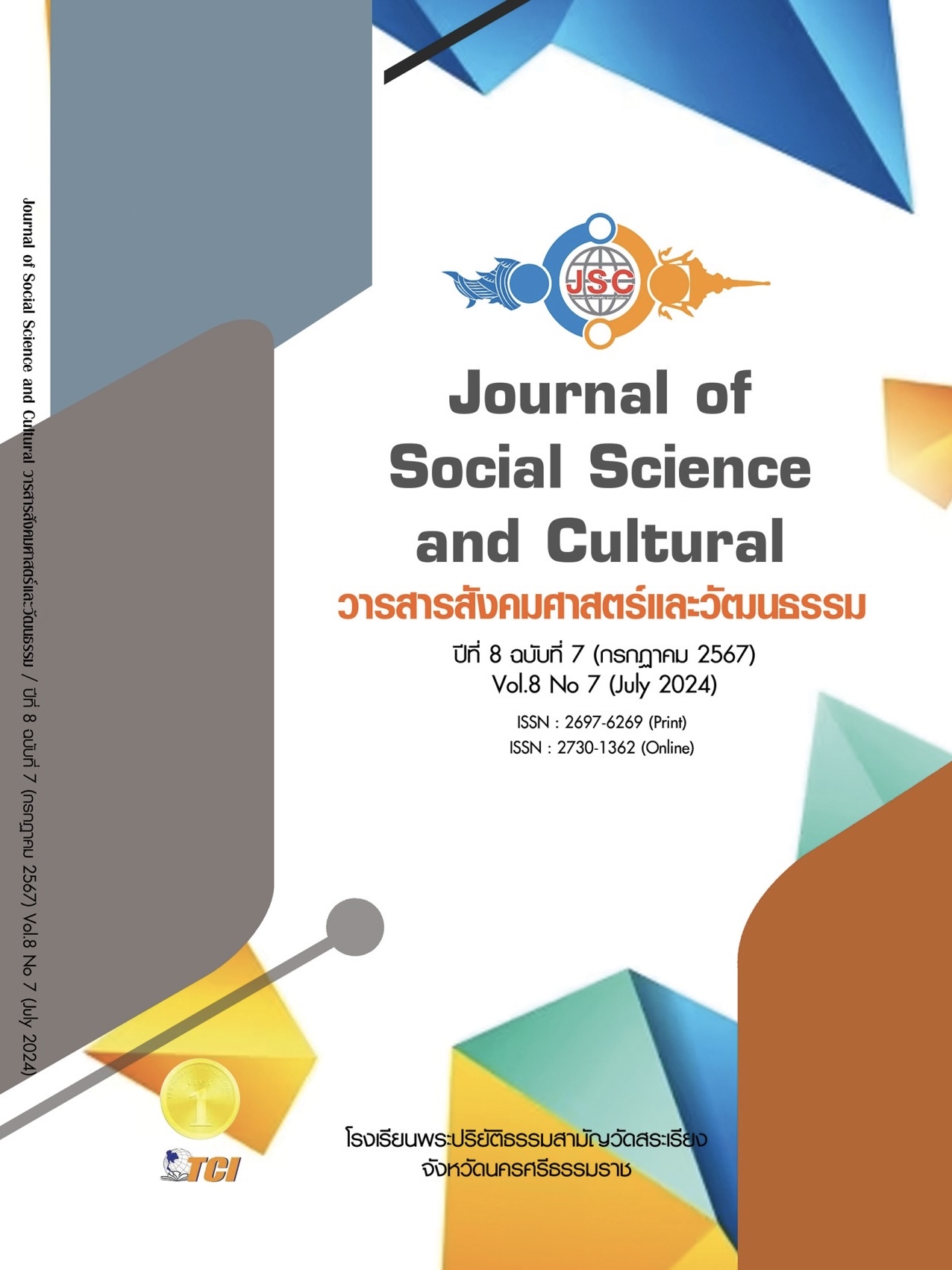THE EFFECTS OF SELF-MANAGEMENT PROMOTING PROGRAM ON HEALTH BELIEF PERCEPTION AND MEDICATION BEHAVIOR AMONG ELDERLY PATIENT WITH UNCONTROLLED AT HYPERTENSION COMMUNITY HEALTH CENTER, UTTARADIT PROVINCE
Main Article Content
Abstract
A quasi - experimental study with two groups, pre - test and post - test, to 1) Compare health beliefs and perception medication between the experimental and control groups before and after the implementation of self - management promoting program 2) Compare health beliefs and perception medication before and after the implementation of the self - management promotion program between the experimental and control groups 3) Compare blood pressure control after the implementation of the self - management promotion program between the experimental and control groups. The sample group consisted of 60 elderly patients with uncontrolled hypertension who came to receive services at the community health center in Uttaradit province, 30 in the experimental group and 30 in the control group. Purposive sampling selection with inclusion and exclusion criteria. The tools used in the experiment were a self - management promoting program, a video promoting medication - taking behavior, and a medication reminder application. The data collection tool was a questionnaire on health beliefs and medication behavior, which was found to have the Index of Item–objective congruence value of each item ranged from .67 - 1.00 and a reliability of .91 and .82 using Cronbach's alpha coefficient. The data were analyzed using statistics, percentages, chi - square, and t - test statistics. Research results: The experimental group had significantly better mean scores in terms of perceived severity and risk, perceived benefits, perceived barriers, and medication behavior after the experiment than before (p<.01), and had significantly better mean scores in terms of perceived severity and risk, perceived benefits, perceived barriers, and medication behavior than the control group (p<.01). The experimental group was also able to control their blood pressure significantly better than the control group (p<.01), with 93.33% of the experimental group able to control their blood pressure compared to 13.33% of the control group
Article Details
References
กมลชนก เจริญวงศา และคณะ. (2565). ผลของโปรแกรมส่งเสริมความร่วมมือการรับประทานยาโดยใช้แอบพลิชั่นไลน์ในผู้ป่วยสูงอายุโรคความดันโลหิตสูงไม่ทราบสาเหตุ. วารสารพยาบาลสาร มหาวิทยาลัยเชียงใหม่, 49(2), 313-325.
เชม ฟ้ามิตินนท์ และคณะ. (2564). ปัจจัยที่มีผลต่อพฤติกรรมการรับประทานยารักษาโรคความดันโลหิตสูงในผู้สูงอายุ. PCFM, 3(2), 59-68.
ดุษนภา ภาคปิยวัชร์. (2560). ผลของโปรแกรมการจัดการตนเองด้านการใช้ยาอย่างเคร่งครัดในผู้ป่วยโรคความดันโลหิตสูงที่ควบคุมไม่ได้ที่คลินิกเอกชนแห่งหนึ่งในจังหวัดปทุมธานี. ใน วิทยานิพนธ์พยาบาลศาสตร์มหาบัณฑิต สาขาวิชาการพยาบาลเวชปฏิบัติชุมชน. มหาวิทยาลัยคริสเตียน.
นพาภรณ์ จันทร์ศรี และคณะ. (2563). ผลของโปรแกรมการจัดการตนเองในผู้ป่วยโรคความดันโลหิตสูงที่ควบคุมความดันโลหิตไม่ได้. วารสารวิทยาศาสตร์และเทคโนโลยีหัวเฉียวเฉลิมพระเกียรติ, 6(2), 58-68.
ภัทร์ธนพร วงษ์เส และคณะ. (2562). ผลของรูปแบบการให้คำปรึกษาผู้ป่วยเพื่อความร่วมมือในการใช้ยาลดความดันโลหิต. ใน การประชุมเสนอผลงานวิจัยระดับชาติ มหาวิทยาลัยสุโขทัยธรรมธิราช ครั้งที่ 9. นนทบุรี: มหาวิทยาลัยสุโขทัยธรรมาธิราช.
ศิรินทรา ด้วงใส. (2560). ผลของโปรแกรมการสนับสนุนการจัดการตนเองแบบ 5 เอ ต่อพฤติกรรมการจัดการตนเองและผลลัพธ์ทางคลินิกในผู้ป่วยความดันโลหิตสูงที่ควบคุมไม่ได้. ใน วิทยานิพนธ์พยาบาลศาสตร มหาบัณฑิต สาขาการพยาบาลผู้ใหญ่. มหาวิทยาลัยสงขลานครินทร์.
ศูนย์สุขภาพชุมชนเมือง อุตรดิตถ์. (2566). สถิติประจำปี 2566. อุตรดิตถ์: ศูนย์สุขภาพชมชนเมือง อุตรดิตถ์.
สุพัตรา สิทธิวัง และคณะ. (2560). ผลของโปรแกรมส่งเสริมการจัดการตนเองต่อพฤติกรรมสุขภาพและระดับความดันโลหิตของผู้ที่เป็นโรคความดันโลหิตสูงที่ควบคุมไม่ได้. พยาบาลสาร, 47(2), 85-97.
สุภาพร สุปินธรรม. (2566). ผลของโปรแกรมการส่งเสริมการใช้ยาต่อความร่วมมือในการใช้ยาของผู้ป่วยโรคเรื้อรัง ที่ได้รับบริการผ่านระบบเภสัชกรรมทางไกล โรงพยาบาลป่าซาง จังหวัดลำพูน. เภสัชกรรมคลินิก, 29(1), 51-64.
ใหมมูน๊ะ สังขาว และเพลินพิศ ฐานิวัฒนานนท์. (2561). การพัฒนาและประเมินผลโปรแกรมสนับสนุนการจัดการ ตนเองต่อความสม่ำเสมอในการรับประทานยาและความดันโลหิตสูงของผู้สูงอายุที่ควบคุมความดันโลหิตไม่ได้. ใน การประชุมเสนอผลงานวิจัยระดับชาติ มหาวิทยาลัยสุโขทัยธรรมาธิราช ครั้งที่ 8. จังหวัดนนทบุรี: มหาวิทยาลัยสุโขทัยธรรมาธิราช.
Aekplakorn, W. (2021). The sixth national health examination survey of Thailand population (2019 - 2020). Bangkok: Faculty of medicine Ramathibodi hospital Mahidol University.
American Heart Association. (2017). 2017 ACC/AHA blood pressure guideline treatment recommendations and risk For cardiovascular events and all - cause mortality. J Am Coll Cardiol, 72(11), 1187-1197.
Burnier, M. et al. (2020). Hypertension and Drug Adherence in the Elderly. Frontiers in Cardiovascular Medicine, 20(5), 1-7.
Centers for Disease Control and Prevention. (2019). National Center for Health Statistics. International Classification of Diseases, Tenth Revision, Clinical Modification (ICD - 10 - CM). Retrieved September 5, 2023, from from https://www.cdc.gov/nchs/icd/icd10cm.htm
Kanfer, F. H. & Gaelick - Buys, L. (1991). Self - management methods. In F. Kanfer & A. Goldtein (Eds.), Helping people change: A text book of methods. (4th ed.) New York: Pergamon Press.
Liu, P. et al. (2020). Frailty and hypertension in older adults: current understanding and future perspectives. Hypertension Research, 43(2020), 1352-1360.
Muli, S. et al. (2020). Prevalence, awareness, treatment, and control of hypertension in older people: results from the population-based KORA-age 1 study. BMC Public Health, 20(2020), 1049.
Ongkulna, K. et al. (2020). Enhancing Self - Management through Geragogy - Based Education in Older Adults with Uncontrolled Hypertension: A Randomized Controlled Trial. Pacific Rim Int J Nurs Res, 26(4), 690-705.
Strecher, V. & Rosenstock, I. (1997). The health belief model. In K. Glanz, F. M. Lewis, & B. K. Rimer (Eds.). Health behavior and health education: Theory, research, and practice (pp. 41 - 58). California: Jossey - Bass.
Sun, Z. (2014). Aging, Arterial Stiffness, and Hypertension. Hypertension, 65(2), 252-256.
World Health Organization. (2023). Global report on hypertension: The race against a silent killer. World Health Organization. Retrieved Febuary 1, 2023, from https://creativecommons.org.


